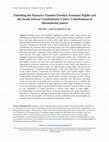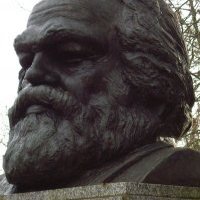Papers by Henry Richardson

This memoriam honors the life of Burns H. Weston (1933-2015). All who knew him, as friend, collea... more This memoriam honors the life of Burns H. Weston (1933-2015). All who knew him, as friend, colleague, student, or collaborator, marveled at his seemingly boundless energy and determination, his focused devotion to whatever project involved him, his deep intellect and flowing humor, his endless imagination for creating a better world, his talent at institution building, and his ongoing curiosity propelling a dedication to achieving progress in the human condition. His professional life featured an inexhaustible determination to use international law to protect human dignity around the world. A prolific scholar, Weston’s scholarship had a number of influences. He became involved with the campus chapter of the NAACP in its fight against racial discrimination while a college student, while also being exposed to international travel at an early age. His understanding of law and international law he attributed to his time at Yale Law School with Myres S. McDougal and Harold D. Lasswell and their Law, Science, and Policy jurisprudence. Weston was an esteemed faculty member at the University of Iowa College of Law, where he developed the international and comparative law program and contributed to Iowa Law’s national and global reputations. He co-founded the University of Iowa Center for Human Rights, serving five years as its inaugural director, later returning as interim director, and serving as Senior Scholar until his death. Weston firmly believed that his human rights scholarship, as prolific and prominent as it was in devising and clarifying progressive rights protective processes under law, must necessarily be accompanied by his personal participation in situations of human rights “law in action,” and by, in his words, his “weighing in” on major contemporary human rights questions. His convictions coupled with his energy in this regard were strong, and he often exhibited personal courage in acting on them.
Social Science Research Network, 1996
2 Temple Int'l & Comp. LJ [Vol. 10 B. Addressing Strife Lying Deeper wit... more 2 Temple Int'l & Comp. LJ [Vol. 10 B. Addressing Strife Lying Deeper within the Nation-State 61 C. Projected Issues of Authority 68 1. The UN System 68 2. Other Expectations of Authority 74 VI. Conclusion: The Delgado Prospect 77 I. Introduction It was first proposed in late ...
Proceedings of the ASIL Annual Meeting, 1993

SSRN Electronic Journal, 2014
From critical jurisprudential examinations of his Letter from the Birmingham Jail, from his Nobel... more From critical jurisprudential examinations of his Letter from the Birmingham Jail, from his Nobel Peace Prize Acceptance Address and his Nobel Lecture, and from his path-breaking speech at the Riverside Church, all in wider context, this article discusses how Martin Luther King's public ministry, post-Montgomery, should be reinterpreted as a global ministry with global authority. It was a ministry based on his early incorporation of Pan-Africanist perspectives, and his conscious merging, including on the most prominent global stage, the American Civil Rights Narrative, the International Human Rights Narrative, and the International Peace Narrative. Prominent in King's evolution of his global ministry, and the evolution of its community authority, is King's commitment to the need to critically and normatively address questions of law and justice, and the relationship of international human rights law to America's foreign policy obligations. His reflections on justice in this regard were, among many other pathways of their influence, compelling in helping to shape judicial opinions of several American cases. This is, finally, a meditation through Dr. King's global ministry on race and the intersection of international and domestic legal narratives.
American Journal of International Law, 1995
American Journal of International Law, 1984
Namibia, a territory in southwest Africa adjacent in the west to South Africa and Botswana, deriv... more Namibia, a territory in southwest Africa adjacent in the west to South Africa and Botswana, derives its notoriety from the fact that its history is a major component of the history and oppression of South African apartheid. But for this fact, the current guerrilla warfare there would perhaps be dismissed as another obscure conflict in some distant land. Few persons on the outside would know about it in detail, and absent special circumstances overtly involving the superpowers or some spreading of the war, fewer still would care.
American Journal of International Law, 2000
American Journal of International Law, 1988

Coming out of the apartheid nightmare in 1994, South Africa became an immediate sovereign beacon ... more Coming out of the apartheid nightmare in 1994, South Africa became an immediate sovereign beacon for global justice with its path-breaking Constitution of 1996 that is the most rights-protective in the world. South Africa's Constitutional Court has garnered global acclaim for the quality of its legal reasoning and the strength of its rights-protective commitment. Decisions such as that prohibiting the death penalty under the Constitution, in a national context of growing crime rates, have inspired rights-protective legal and judicial approaches throughout the global community. This is similarly true for the Court's decisions - especially in the Grootboom and Treatment Action Campaign cases - more recently. This paper explores the Court's contributions to global justice notions through its legal reasoning in Grootboom and subsequent related cases. Particularly, the paper examines the Court's use of reasonableness as an essential element of its justiciability analysis,...
Proceedings of the ASIL Annual Meeting, 1995
Distribution électronique Cairn.info pour Le Seuil. © Le Seuil. Tous droits réservés pour tous pa... more Distribution électronique Cairn.info pour Le Seuil. © Le Seuil. Tous droits réservés pour tous pays. La reproduction ou représentation de cet article, notamment par photocopie, n'est autorisée que dans les limites des conditions générales d'utilisation du site ou, le cas échéant, des conditions générales de la licence souscrite par votre établissement. Toute autre reproduction ou représentation, en tout ou partie, sous quelque forme et de quelque manière que ce soit, est interdite sauf accord préalable et écrit de l'éditeur, en dehors des cas prévus par la législation en vigueur en France. Il est précisé que son stockage dans une base de données est également interdit.
Proceedings of the ASIL Annual Meeting, 1992

Proceedings of the ASIL Annual Meeting, 1995
We are convening this panel during a time not only when the global community shows encouraging si... more We are convening this panel during a time not only when the global community shows encouraging signs toward expanding international human rights law, but also when there is destructive opposition toward the same law. This period is equally uncertain for Africa as a Continent and for the human rights of its many peoples. In this sense, our panel continues the inquiry about post-Cold War human rights consequences in this highly interdependent world community. Those alleged realists who argue that human rights law is founded on the balance of power among contending states will now observe that Africa suffers regarding international assistance to implement human rights because the end of the Cold War has destroyed the Soviet option, thus removing Africa from the list of Western vital interests requiring assistance. Others might argue that Africa and its peoples are only now of use to the West, insofar as they live under governments the industrialized states can recognize as both "democratic" and hospitable to free market economies. If these conditions are met, so the argument goes, then basic human rights will follow. Such pseudo-geopolitical reasoning would not merit much attention save that it, or close analogues, have occupied considerable official, media and academic space in the past few years. It is fundamentally essential that the rights of African peoples and individuals be upheld, that African states continue to develop, and particularly that human rights law correctly meet the challenges of African conditions. The inherent humanity and worth of all of Africa's peoples and of each of its individual citizens is the full equal of those of any other country, North or South, in the world. From its history of slavery and European colonialism, South African apartheid, and genocide in Rwanda and Uganda, overlaying its rich customs and traditional forms of democratic governance, Africa is the lodestone for the moral expectations that must undergird the international law of human rights. If human rights law cannot appropriately address the conditions of Africa, its fitness for doing so in any other region of the world community is called into question. Against this background, this panel is convened in a particular policy context regarding expectations about the prescription and application of human rights law to African governments and peoples. A prominent part of this context is the characterization by a number of Western policy makers of many African states as "failed," coupled with assertions that such failure is the sole and exclusive responsibility of African governments themselves. They assert that the only remedy to these alleged failures is to allow under international law massive outside intervention to reform local governmental and wealth processes, whether through expanded peacekeeping operations or unilateral state action. Such assertions have now sunk to the level where the re-institution of European colonialism over Africa has been proposed, by William Pfaff in a recent article in the esteemed quarterly Foreign Affairs, as the key solution to Africa's problems. Leaving aside the obvious racist and paternalistic implications of such a proposal, it is akin to, in relations

American Journal of International Law, 2016
Burns Weston, a member of the Board of Editors of this Journal from 1974 to 1999, and an Honorary... more Burns Weston, a member of the Board of Editors of this Journal from 1974 to 1999, and an Honorary Editor thereafter, died unexpectedly on October 28, 2015, late in his eighty-first year, in Iowa City, Iowa. All who knew him, as friend, colleague, student, or collaborator, marveled at his seemingly boundless energy and determination, his focused devotion to whatever project involved him, his deep intellect and flowing humor, his endless imagination for creating a better world, his talent at institution building, and his ongoing curiosity propelling a dedication to achieving progress in the human condition. His professional life featured an inexhaustible determination to use international law to protect human dignity around the world. His interests, expertise, and scholarship in international claims law, human rights law, environmental law, nuclear disarmament, and global governance in particular were surpassing in their consistent excellence, continuous push against familiar doctrina...
American Journal of International Law, 1972

As a chapter in the valuable collection Africa and the Future of International Criminal Justice (... more As a chapter in the valuable collection Africa and the Future of International Criminal Justice (Vincent O. Nmehielle ed., Eleven Publ. 2012), this discussion argues that the debate about the relationship between the ICC and Africa should not be confined to interpreting the treaty obligations between the ICC and African states. It must also and equally address issues of African equity in the global criminal law process. In understanding these imperatives of equity, three policy Dilemmas regarding international criminal law must be identified and explored as inherent in the general debate. One centers on the ‘principle of necessary self-help for subordinated peoples', including exploring the issue of complementarity in Africa under international criminal law. A second Dilemma revolves around the global authority of the Nuremberg Principles and African regional authority, including Africa’s ability under the African Union to collectively make decisions on how best to deal with issues of international criminal accountability of its subjects, and including a critical discussion of the Yerodia case. And a final Dilemma goes to the normative assumptions and grounding for the authority to decide among strategies and issues, where “peace” approaches to international criminality, resting on negotiations with accused wrongdoers and diplomacy, appear to collide with and undermine “justice” approaches, incorporating the priority of invoking and preparing international criminal legal accountability strategies against the same wrongdoers, including issues of immunity and amnesty, and including discussion of the Bashir and Gaddaffi arrest warrants. These three Dilemmas demand informed decision making to enable African peoples to establish the most equitable non-subordinated relationship to ICC authority, and to determine the correct balances of legitimacy, in the context of Africa’s role in the global international criminal law process.











Uploads
Papers by Henry Richardson